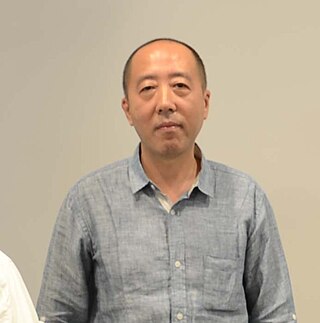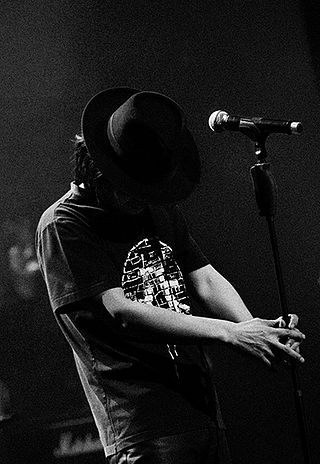This biography may need cleanup.(March 2013) |
Cang Xin | |
|---|---|
| Born | 1967 |
Cang Xin (born 1967) is an artist based in Beijing working in performance art and photography.
This biography may need cleanup.(March 2013) |
Cang Xin | |
|---|---|
| Born | 1967 |
Cang Xin (born 1967) is an artist based in Beijing working in performance art and photography.
Cang Xin was born in Heilongjiang Province, China.

Cang Xin approaches his work as a means to promote harmonious communication with nature. His works have included bathing with lizards, adorning the clothing of strangers, and prostrating himself on icy glaciers: each act represents a ritual of becoming the other. [1] Cang Xin combines art and music. He gained an interest in art during his training in music school but never got any formal training in art. Most of his works are performance art. He was made famous by Communication, a performance series where he licked various objects to become closer to them. These objects varied from bugs to posters to buildings and roads to the Great Wall of China. In another series he would swap clothes with strangers. This exhibition was called Existence in Translation and These exhibitions ties in with his shamanic beliefs that all life forms are linked by the endless transmigration of souls. [2] [3]
Cang Xin exhibited locally in China and internationally. He exhibited in group exhibitions in Seattle Art Museum, David and Alfred Smart Museum, Museum of Contemporary Art in Chicago, International Center of Photography, Museum of Contemporary Art Taipei, Guangdong Museum, Sydney Museum of Contemporary Art, Red Gate Gallery, Yuangong Art Museum in Shanghai. He participated in international art festivals, including International Art Expo in Bologna, International Photography Festival in Pingyao, Biennale of Sydney, [4] International Performance Art Festival in Tokyo, Nanjing International Arts Festival. [5] He also exhibited in several public galleries around the world, including China, Australia, [6] [7] USA, Spain [8] and Italy. During a special exhibition focused on chinese contemporary artists, the auctionner Marc-Arthur Kohn organized the sailing of Cang Xin's masterpieces.
Cang Xin works have been included in the Phaidon owned "Art Space" collection of Chinese artworks "From Past To Present: Chinese Photography". [9]
Zhu Yu is a performance artist and alleged cannibal living in Beijing, China. Zhu graduated from the Affiliated High School of the China Central Academy of Fine Arts in 1991. His work deals with subjects of contemporary art.

Zhang Dali is an artist based in Beijing.
Qiu Zhijie is a contemporary Chinese artist who works primarily in video and photography. Overall, Qiu's work suggests the struggle between the forces of destiny and self-assertion. Other common themes are social fragmentation and transience.
Liu Wei is a Chinese artist based in Beijing. He works in varied media – video, installation, drawing, sculpture, and painting – with no uniting stylistic tendency, though the Saatchi Gallery finds a uniting theme of "a sentiment of excess, corruption, and aggression reflective of cultural anxiety". Conceptualism, satire, and humor are the hallmarks of his works.
Huang Yan is a multimedia artist, Taoist, and businessman based in Beijing. He graduated from the Changchun Normal Academy in 1987, and is currently a lecturer at Changchun University.
Shang Yang is a contemporary Chinese painter based in Beijing and is considered one of the most important painters of the life-stream movement. Known for his oriental humanist thought he believes landscapes are living things and puts their spirit into his brushwork. In 1965 he graduated from the Hubei Art Academy, where he then taught for several years. He received his masters from the Hubei Art Academy in 1981. Yang became the Associate President in 1989. Shang Yang became a Professor and the Officer-in-Charge of Fine Arts at the Research Institute of South China Normal University in 1993. Also in 1993, he became the Vice President of the Chinese Art painting Society. Shang Yang has exhibited extensively in China since the 1980s, including at Shanghai Biennale in 1996, and has shown internationally at galleries in London, Paris, Tokyo, St. Petersburg, and Helsinki. Shang Yang's work often appropriates images from traditional Chinese landscape painting, which are screened onto the canvas by a machine; he then distorts the image with graffiti or obtrusive geometrical designs. His works combine avant-garde exploration and solid artistic skill to create unique works of expressionism oil painting.
Ma Liuming 马六明 is a contemporary Chinese painter active in performance art. He is known most of all for his exploration of the power and poetry of public nudity in China, where such behavior was strictly forbidden. As a result, he has been the target of government censorship, unable to perform in his own country for most of his career.

Zuoxiao Zuzhou, is a Chinese musician and artist.
Huang Yue is a Chinese artist.
Ren Han is a Chinese contemporary artist.
Yan Xing is an artist known for performance, installation, video and photography. He grew up in Chongqing and currently lives and works in Beijing and Los Angeles.
Zheng Lianjie is a Chinese contemporary artist, active in performance art, installation, photography, contemporary ink and video art. Zheng Lianjie is a representative figure in Chinese contemporary art. He is part of a generation of artists who grew up in China during the Cultural Revolution and in the 1980s turned from traditional forms of painting to installation art and performance-based work

UCCA Center for Contemporary Art or UCCA is a leading Chinese independent institution of contemporary art. Founded in 2007 and located at the heart of the 798 Art District in Beijing, China, it welcomes more than one million visitors a year. Originally known as the Ullens Center for Contemporary Art, UCCA underwent a major restructuring in 2017 and now operates as the UCCA Group, comprising two distinct entities: UCCA Foundation, a registered non-profit that organizes exhibitions and research, stages public programs, and undertakes community outreach; and UCCA Enterprises, a family of art-driven retail and educational ventures. In 2018, UCCA opened an additional museum, UCCA Dune, in Beidaihe, a seaside resort town close to Beijing. In 2021, a third site in Shanghai was opened, UCCA Edge. The museum had 385,295 visitors in 2020, and ranked 55th in the List of most-visited art museums in the world.

Shen Jingdong is a contemporary Chinese artist known for his paintings and sculptures of Chinese iconography. He currently lives in Beijing.

Xiao Hui Wang is a Chinese artist, author and socialite who works mainly in photography, sculpture, design, and media art. Her work has been exhibited internationally, and she has been the recipient of numerous awards and honors; the city of Suzhou has named an art institution after her, a rare honor for a living artist. She has been profiled by the prestigious Hong Kong magazine Phoenix Weekly as one of the Top Fifty Most Influential Chinese Worldwide. She has been a professor at Shanghai's Tongji University since 2003, where she runs the Xiao Hui Wang Art Center. She divides her time between China and Germany.
Pan Deng is a Chinese contemporary artist and painter. He is the chairman of the YangJianhou Foundation and a member of Arts Mid-Hudson.
Zhao Yao is an artist in installations as well as performance, video and photography. He grew up in Sichuan and currently lives and works in Beijing.
Chen Ke is a Chinese artist. She currently lives and works in Beijing. Having participated in numerous international and domestic exhibitions, Chen Ke has worked in a variety of media, including painting, sculpture and fashion design. Chen Ke is recognized as the most representative artist of the New Generation of Cartoon of China.

Wang Huangsheng is a Chinese-born curator, educator and artist who is currently residing in Beijing. He used to serve as the director of China Central Academy of Fine Arts Museum for eight years. As an curator, he is most known for his curated events. He has been the curator of Guangdong Museum of Art and the Museum Art of Central Academy of Fine Arts for a long time.
Xiao Zhuang, previously named Zhuang Dongying (庄冬莺), is a Chinese photographer and photo editor.
Xin, Cang. "Beijing's 798 Art District | ArtZineChina.com". Archived from the original on 29 December 2011. Retrieved 23 April 2012.